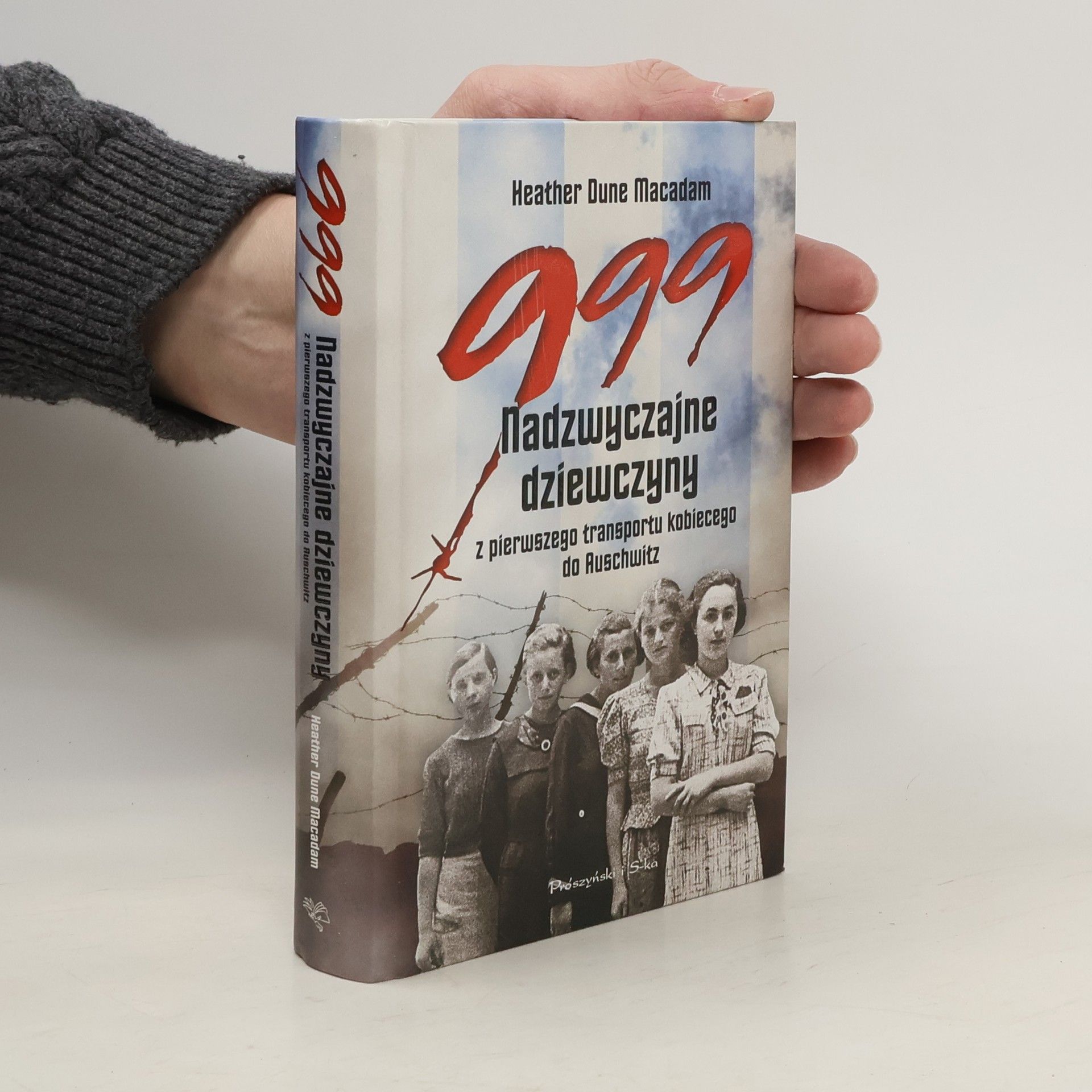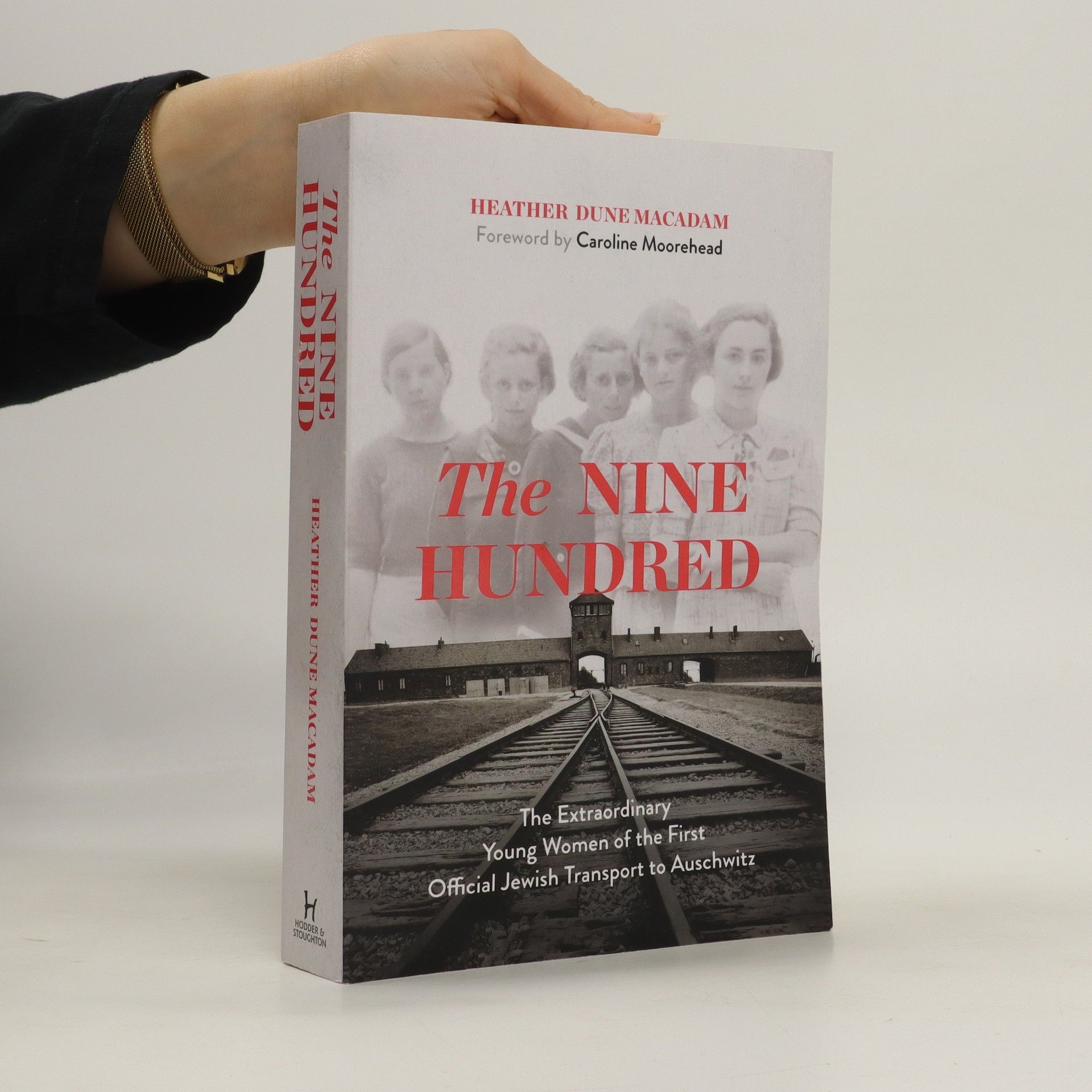The Nine Hundred
- 464 pages
- 17 hours of reading
The untold story of the 999 young, unmarried Jewish women who were tricked into boarding a train in Poprad, Slovakia on March 25, 1942 that became the first official transport to Auschwitz.
This author delves into the shadowed chapters of history to resurrect forgotten narratives, focusing her literary lens on the resilience of the human spirit amidst unimaginable suffering. Her work prominently features the experiences of young women during the Holocaust, bringing them to the forefront of historical accounts. Through meticulous research and a compelling narrative style, she breathes life into historical figures, ensuring their voices resonate. Her dedication to combating historical denial and oblivion is evident, offering readers a profoundly moving and educational experience.







The untold story of the 999 young, unmarried Jewish women who were tricked into boarding a train in Poprad, Slovakia on March 25, 1942 that became the first official transport to Auschwitz.
On March 25, 1942, nearly a thousand young, unmarried Jewish women boarded a train in Poprad, Slovakia. Filled with a sense of adventure and national pride, they left their parents' homes wearing their best clothes and confidently waving good-bye. Believing they were going to work in a factory for a few months, they were eager to report for government service. Instead, the young women-many of them teenagers-were sent to Auschwitz. Their government paid 500 Reichsmarks (about 160) apiece for the Nazis to take them as slave labour. Of those 999 innocent deportees, only a few would survive.The facts of the first official Jewish transport to Auschwitz are little known, yet profoundly relevant today. These were not resistance fighters or prisoners of war. There were no men among them. Sent to almost certain death, the young women were powerless and insignificant not only because they were Jewish-but also because they were female. Now, acclaimed author Heather Dune Macadam reveals their poignant stories, drawing on extensive interviews with survivors, and consulting with historians, witnesses, and relatives of those first deportees to create an important addition to Holocaust literature and women's history.
On March 25, 1942, nearly a thousand young, unmarried Jewish women boarded a train in Poprad, Slovakia. Filled with a sense of adventure and national pride, they left their parents' homes wearing their best clothes and confidently waving good-bye. Believing they were going to work in a factory... číst celé
Paris, 1940. The City of Light has fallen under German Occupation. Among patriotic Parisians, the pursuit of art, culture, and jazz have become bold acts of defiance. So has forbidden romance for talented and spirited Jewish teenager Annette Zelman, a student at the Beaux-Arts, and dashing young Catholic poet Jean Jausion. Despite their devout families' vehement opposition, the young couple finds acceptance at the famed Café de Flore, whose habitues include Simone de Beauvoir, Jean-Paul Sartre, Pablo Picasso, Django Reinhardt, and other luminaries of the Latin Quarter's creative world. For a time, Annette and Jean feel they have eluded the brute might of the relentless Nazis--and more immediately, their parents' threats and demands. But as restrictions on the Jewish community escalate to arrests and deportations, the malevolent forces gathering around the young lovers set them on divergent and tragically inevitable paths. Drawn from never-before-published family letters and other treasures, as well as archival sources and exclusive interviews, Star-Crossed offers precious insight into the Holocaust and the lives that French people bravely led under the Hitler regime.
A Story of Sisters in AuschwitzAs a young woman, Rena Kornreich endured the Nazi death camps for almost three and a half years. Rena's Promise, the remarkable story of her survival, shows how her relationship with her younger sister, Danka, gave her the will to persevere under unimaginable circumstances. "Deeply moving."-Dena Taylor, San Francisco Chronicle
Dvadsiateho piateho marca 1942 takmer tisíc mladých nevydatých židovských žien a dievčat nastúpilo v Poprade do vlaku. Oblečené v najlepších šatách dôverčivo zakývali na rozlúčku svojim rodičom a vo vidine dobrodružstva odišli do sveta. Prihlásili sa na „prácu“, lebo verili, že si odkrútia pár mesiacov v nejakej továrni a vrátia sa domov. Realita však bola celkom iná – poslali ich rovno do Osvienčimu, kde ich nútili otročiť. Vláda slovenského štátu zaplatila Nemcom 500 ríšskych mariek za každého takto „vysídleného“ Žida alebo Židovku. Z 999 deportovaných žien a dievčat z prvého transportu prežilo len niekoľko. O prvom oficiálnom židovskom transporte do Osvienčimu sa vie len málo, ale tieto skutočnosti sú ešte aj dnes veľmi dôležité. V dobytčiakoch sa netlačili partizáni ani vojnoví zajatci, muži v ňom totiž vôbec neboli. Len necelá tisícka mladých dievčat a žien, ktoré slovenské vládne orgány poslali na takmer istú smrť. Bezmocné a bezvýznamné neboli len pre svoj židovský pôvod, ale aj preto, že to boli ženy. Heather Dune Macadam, uznávaná autorka z USA, odkrýva ich tragické príbehy založené na rozhovoroch s preživšími, na konzultáciách s historikmi, očitými svedkami a na rozhovoroch s príbuznými prvých žien deportovaných zo Slovenska do Osvienčimu. Jej kniha je dôležitým doplnkom v mozaike literatúry o holokauste a o histórii žien.
Paríž, 1940. Mesto svetiel okupujú nacisti. Symbolom vzdoru sa stáva umenie, kultúra a džez. Je ním však aj zakázaná láska? Ako tá medzi židovskou študentkou umenia Annette Zelmanovou a začínajúcim básnikom a katolíkom Jeanom Jausionom. Mladí napriek počiatočnému odporu rodiny nachádzajú domov v bohémskom prostredí slávnej Café de Flore, kde sa stretávajú najväčšie osobnosti Latinskej štvrte, ako je Simone de Beauvoir, Jean-Paul Sartre či Pablo Picasso. Na okamih sa zdá, že Annette a Jean unikli nacistom aj námietkam rodičov. Reštriktívne protižidovské opatrenia sa však stupňujú, dochádza k prvým zadržaniam a deportáciám a nemilosrdný osud napokon zamilovaných násilne roztrhne. Ich príbeh, doplnený vzácnou rodinnou korešpondenciou, archívnymi zdrojmi a terénnym výskumom, je svedectvom o tragédii holokaustu a živote obyčajných ľudí za okupácie.
Annette je temperamentní dívka, která studuje pařížskou Akademii krásných umění. Jean je básník, vůdčí postava dadaistické skupiny Les Réverberes. Oba milují jazz a oba se potkávají v proslulé pařížské kavárně Café de Flore, kde lze zahlédnout Picassa, Simone de Beauvoir a další osobnosti pařížského uměleckého života. Mezi Annette a Jeanem se rozhoří láska a plánují společnou budoucnost. Avšak píše se rok 1942 a Annette je Židovka…